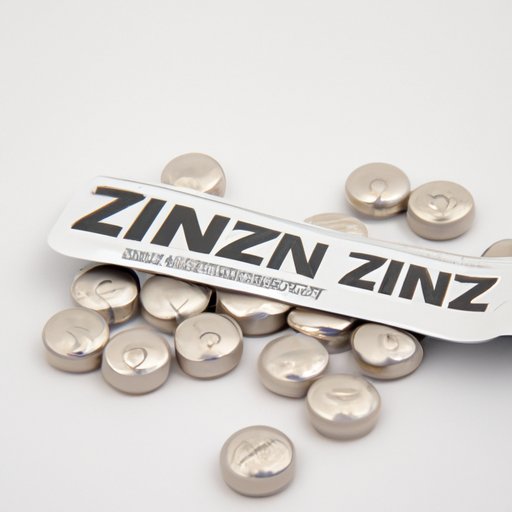Introduction
Zinc is an essential mineral found in many foods and available as a dietary supplement. It plays an important role in supporting a healthy immune system, wound healing, and normal growth and development. But how much zinc can you safely take each day? In this article, we’ll explore the recommended daily allowance of zinc, its potential health benefits, and tips for finding quality zinc supplements.

Recommended Daily Allowance of Zinc and How Much You Should Take
The recommended dietary allowance (RDA) of zinc for adults is 11 milligrams (mg) per day for men and 8 mg per day for women. According to the National Institutes of Health, most people should aim to get at least 8 to 11 mg of zinc per day from their diet. It’s important to note that pregnant and breastfeeding women need higher amounts of zinc than the general population.
Dietary sources of zinc include red meat, poultry, seafood, dairy products, nuts, legumes, and whole grains. Some plant-based foods are also fortified with zinc, such as breakfast cereals and plant-based milks. If you’re looking to increase your intake of zinc, consider adding more of these foods to your diet.

Potential Health Benefits of Taking Zinc Supplements
Studies have suggested that zinc may have numerous health benefits when taken as a supplement. According to a review published in the journal Nutrients, zinc may help reduce inflammation, support wound healing, improve cognitive function, and boost immune health. Additionally, zinc may be beneficial for treating colds, acne, age-related macular degeneration, and other conditions.
It’s important to note that taking too much zinc can be dangerous. According to the NIH, the upper limit of zinc intake is 40 mg per day for adults. Taking more than this can lead to side effects such as nausea, vomiting, stomach cramps, and diarrhea. High doses of zinc can also interfere with the absorption of other minerals, such as copper and iron.

Tips for Finding Quality Zinc Supplements
If you’re considering taking a zinc supplement, it’s important to make sure you’re getting a quality product. The best way to do this is to buy from reputable brands, such as those certified by organizations like USP or NSF International. You should also look for products that list the exact amount of zinc on the label.
When shopping for zinc supplements, it’s also important to check the expiration date. Make sure the product you’re buying is still within its shelf life, as expired supplements may not contain the same amount of active ingredients as stated on the label.
Are There Any Natural Ways to Get Zinc?
In addition to supplements, there are plenty of natural ways to get zinc in your diet. Foods high in zinc include oysters, beef, crab, pork, beans, nuts, seeds, and whole grains. Other natural sources include eggs, dairy products, mushrooms, and dark chocolate.
Common Questions About Zinc Dosage and Safety
When it comes to taking zinc supplements, there are a few common questions that come up. One of the most frequently asked questions is: “How much zinc can I take per day?” The answer is that the recommended daily allowance (RDA) of zinc for adults is 11 milligrams (mg) per day for men and 8 mg per day for women. The upper limit of zinc intake is 40 mg per day for adults.
Another common question is: “Are there any side effects?” Taking too much zinc can lead to side effects such as nausea, vomiting, stomach cramps, and diarrhea. High doses of zinc can also interfere with the absorption of other minerals, such as copper and iron.
Conclusion
Zinc is an essential mineral found in many foods and available as a dietary supplement. It plays an important role in supporting a healthy immune system, wound healing, and normal growth and development. The recommended dietary allowance (RDA) of zinc for adults is 11 milligrams (mg) per day for men and 8 mg per day for women. Studies have suggested that zinc may have numerous health benefits when taken as a supplement, but it’s important to be aware of the potential risks associated with taking too much zinc. When shopping for zinc supplements, make sure to buy from reputable brands and check the expiration date.
If you’re looking for natural sources of zinc, consider adding more oysters, beef, crab, pork, beans, nuts, seeds, and whole grains to your diet. Eggs, dairy products, mushrooms, and dark chocolate are also good sources of zinc. Ultimately, understanding the recommended daily allowance of zinc, potential health benefits, and tips for finding quality supplements can help you make informed decisions about your zinc intake.
(Note: Is this article not meeting your expectations? Do you have knowledge or insights to share? Unlock new opportunities and expand your reach by joining our authors team. Click Registration to join us and share your expertise with our readers.)
